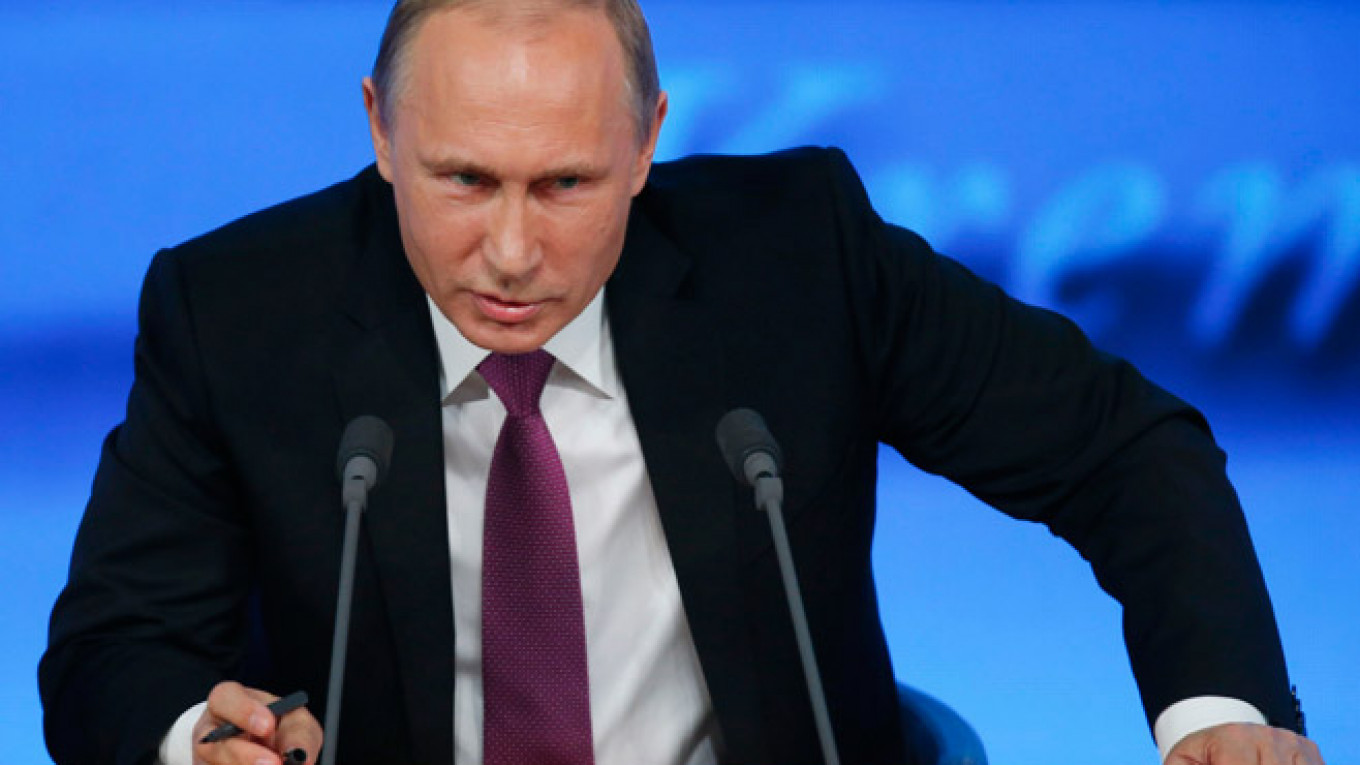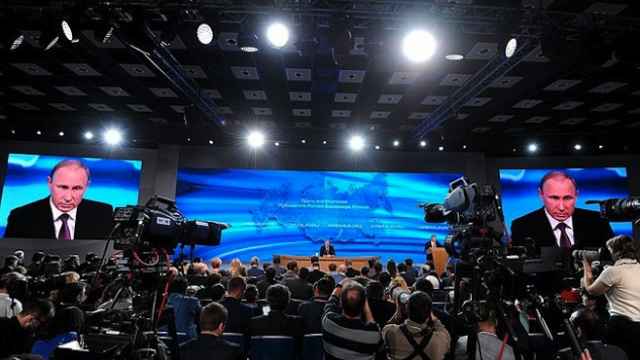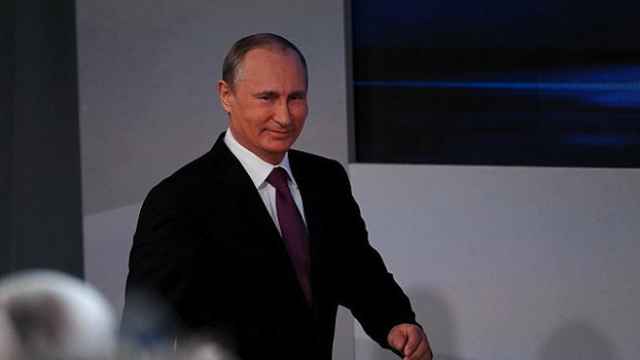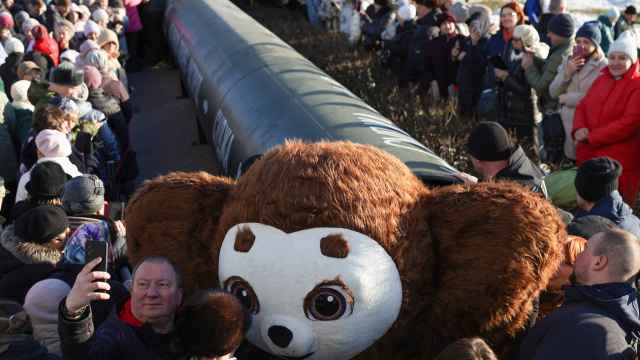Beaming confidence and exuding a readiness to deflect blame, President Vladimir Putin refrained from seizing the opportunity to announce any sweeping policy reforms with regard to Russia's economic crisis during his annual news conference Thursday.
Hundreds of journalists from across Russia and around the globe attended the event, many of whom were relatively assertive with their questions this year.
In the past, the atmosphere has often been sympathetic, spurring speculation that questions had been selected in advance. But this year's reporters tended to veer between the neutral and the negative, with Ukraine agency UNIAN's Roman Tsymbalyuk brazenly asking: "How many Russian servicemen and units of equipment have you sent there, and how many of them have been killed in Ukraine? What would you as the commander-in-chief say to the families of the Russian servicemen and officers killed in Ukraine?"
During the event, Putin reiterated his view that the current economic crisis — which has seen the ruble plummet over 45 percent against the U.S. dollar since January and is expected to spur inflation to 10 percent by the year's end — is only temporary and will end "inevitably" within two years maximum.
With equal aplomb, Putin made clear his resolve not to cower to the West, echoing his usual mantra that NATO and the U.S. provoked Russia, first by expanding eastward and then by staging a coup in Kiev in February, overthrowing Ukraine's former regime to advance Western interests.
In the domestic sphere, Putin vowed his refusal to cover for the actions of his allies, but sent a conciliatory signal to the country's oligarchs in announcing that he had invited Vladimir Yevtushenkov, head of business conglomerate Sistema who was freed from house arrest just one day prior, to a meeting with other top business executives.
Don't Blame Me for Ruble's Plight
Economy-related issues and the ruble crisis took center stage throughout the conference. Putin essentially defended his own performance, saying the government would adopt measures that had already been proven effective during the 2008 financial crisis.
He reiterated on several occasions during the event that the economy is bound to bounce back, and that the current state of affairs will be behind us soon, with two years being the worst case scenario.
But every cloud has its silver lining. The plummeting price of oil has given Russia impetus to diversify its economy, something that it hasn't managed to do for the past two decades owing to the fact that oil extraction has traditionally proven more lucrative than other business endeavors, Putin said.
Putin asserted that Russia's financial recovery is linked to the global economy, which he is confident will surge in the coming years, in turn creating an increased demand for energy resources.
He praised the government's handling of the crisis thus far, admitting that some measures — perhaps with reference to the Central Bank's interest rate hike on Monday — could have been adopted more quickly. He also said the government must do a better job tackling spiraling inflation, especially in terms of gasoline and food.
It's All the West's Fault
With regard to foreign affairs, Putin's message was consistently anti-Western. He accused the West of attempting to contain Russia and crush its national interests.
"After the fall of the Berlin Wall and the breakup of the Soviet Union, Russia opened itself to our partners. What did we see? Direct and fully fledged support for terrorism in the North Caucasus. They directly supported terrorism, you understand? Is that what partners usually do? I won't go into details on that, but this is an established fact. And everyone knows it," he said, when asked about the economic consequences of Crimea.
More recently, "unprecedented and clearly orchestrated attempts were made [by Western journalists] to discredit our efforts to organize and host the Olympics," he said.
He compared Russia's aspiration of preserving its nationhood to a bear defending his turf. "You see, if we continue the analogy, sometimes I think that maybe it would be best if our bear just sat still. Maybe he should stop chasing pigs and boars around the taiga and start picking berries and eating honey. Maybe then he will be left alone. But no, he won't be! Because someone will always try to chain him up. As soon as he's chained they will tear out his teeth and claws," he said.
In essence, Russia was forced to adopt a more assertive stance in the international arena, and was accordingly driven to revamp its military forces.
The situation in Ukraine was discussed at length with Putin largely dodging Tsymbalyuk's question, which assumed the presence of Russian troops and weapons in Ukraine's turbulent east. "All those who are following their heart and are fulfilling their duty by voluntarily taking part in hostilities, including in southeast Ukraine, are not mercenaries, since they are not paid for what they do," he said at one point in the course of a lengthy response.
He added his desire to see peace in Ukraine once again. "I hope that by engaging in dialogue — and we are ready to assume the role of intermediaries in this respect — we will succeed in establishing a direct political dialogue, and by employing such methods and political instruments we will reach a settlement and restore a single political space," he said. He expressed optimism that Ukrainian President Petro Poroshenko wants peace as well, noting that Poroshenko isn't the only one making decisions in Kiev.
Loyalty and Love
Putin took advantage of the occasion to reiterate his unwillingness to cover for his friends at the helms of Russian regions and state-run companies.
In the aftermath of a 4 Dec. terror attack on Grozny, Chechen leader Ramzan Kadyrov vowed that families of terrorists in the republic would be deported and their houses would be razed to the ground. Afterward, activists claimed that a number of homes were burned to the ground, many with links to the alleged militants.
Putin said at the news conference that Kadyrov's comments had been "emotional," adding that the relatives of terrorists are often aware of their loved ones' plans.
Still, the government must check if any people have been illegally forced to leave the republic, or if their houses have been burnt down, Putin said.
He went on to praise one of his closest allies, Igor Sechin, referring to him as an "effective manager," though noting that he "doesn't know" what he earns for running Rosneft. Sechin won a lawsuit against Russia's leading business newspaper Vedomosti in August over an editorial that implied he had the capacity to unlawfully influence state officials due to his proximity to President Putin. Earlier Sechin also successfully sued Forbes Russia and daily newspaper Komsomolskaya Pravda for referring to him as Russia's highest-paid CEO, and estimating that he earned $50 million annually.
Putin dismissed the possibility of a palace coup in Russia, saying that he derives his legitimacy from the Russian people themselves: "There are no palaces in Russia, thus there cannot be a palace coup."
The president went on to explain that there is a fine line between patriotic dissenters who are driven by a love for their own country, and members of the "fifth column" who work with other states' interests in mind. Putin failed to provide a modern example to demonstrate his point.
But it wasn't all stern talk of economic resilience and national pride. On a surprisingly intimate note, Putin said that he is in love with someone who loves him back, and that he remains on good terms with his ex-wife Lyudmila.
Contact the author at i.nechepurenko@imedia.ru
A Message from The Moscow Times:
Dear readers,
We are facing unprecedented challenges. Russia's Prosecutor General's Office has designated The Moscow Times as an "undesirable" organization, criminalizing our work and putting our staff at risk of prosecution. This follows our earlier unjust labeling as a "foreign agent."
These actions are direct attempts to silence independent journalism in Russia. The authorities claim our work "discredits the decisions of the Russian leadership." We see things differently: we strive to provide accurate, unbiased reporting on Russia.
We, the journalists of The Moscow Times, refuse to be silenced. But to continue our work, we need your help.
Your support, no matter how small, makes a world of difference. If you can, please support us monthly starting from just $2. It's quick to set up, and every contribution makes a significant impact.
By supporting The Moscow Times, you're defending open, independent journalism in the face of repression. Thank you for standing with us.
Remind me later.






